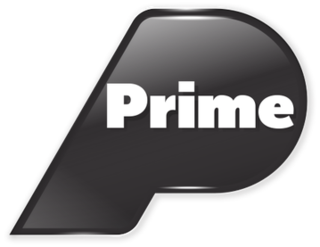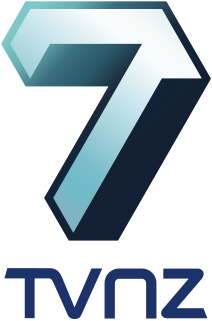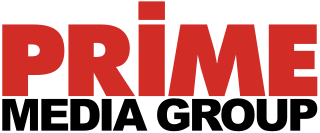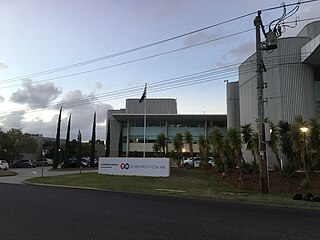Shaun Brown is the former managing director of the Special Broadcasting Service (SBS) in Australia from 2006 to 2011.
Shaun Brown is the former managing director of the Special Broadcasting Service (SBS) in Australia from 2006 to 2011.
Brown began his broadcasting career with the Australian Broadcasting Commission (ABC) in Perth in 1970. [1] Among his reporting assignments was, in 1973, coverage of French nuclear testing at Muroroa Atoll from on board the frigate HMNZS Otago, for which he was awarded the New Zealand Special Service Medal in 2002. He also received industry recognition for his work as an investigative current affairs reporter and a producer of election night programmes.[ citation needed ][ where? ]
In 1994, Television New Zealand (TVNZ) appointed Brown Managing Editor, News and Current Affairs. He was made Head of TV One in 1997. In 2001, he was appointed Head of Television on an annual salary reported to be $340,000, [2] responsible for running both TVNZ channels. Brown held this TVNZ position for nine months before the position was eliminated by chief executive Ian Fraser. [2]
During his time at TVNZ, the network was accused by New Zealand Prime Minister Helen Clark of being "shamelessly ratings driven" according to a report. [3]
His position as Head of Television at TVNZ ended in 2002. This followed the Hawkesby affair. Hawkesby was hired from TV3 by TVNZ to read the news, replacing Richard Long, but was later sacked. Hawkesby was subsequently awarded a record-breaking $6 million by an arbitrator. [2]
Brown joined SBS as Head of Television in January 2003. [1]
He was appointed managing director of SBS on 14 February 2006 for four years. At SBS Brown lifted investment in commissioned programmes from around $4 million in 2002 to around $30 million in 2009. During the same period SBS audience share increased by 22 per cent to a total share of 6.2 per cent.[ citation needed ]
Brown was at the helm of SBS during some controversial times, including the 2006 decision by the SBS Board to introduce advertising within television programming, as opposed to in-between programming. [4] While Brown admitted that SBS audiences reacted strongly to the introduction of in-programme breaks, [5] after their introduction SBS increased its audience share to record levels, and increased the revenue raised through television advertising to $46.3 million in 2007-08. [6]
In 2008, the SBS Board extended his contract until July 2011. During his time at SBS, the broadcaster's ratings share rose to 6.2 per cent [7] and Australian production increased. [8]
Brown was a delegate to Prime Minister Kevin Rudd's 2008 2020 Summit.[ citation needed ]
In 2009, Brown likened the cash-strapped broadcaster to Dickensian character Oliver Twist who kept asking the Australian Government for more funding. [8]
After Brown had announced his retirement, Michael Ebeid, former Australian Broadcasting Corporation head of strategy and marketing, was appointed as the new CEO and Managing Director of SBS, commencing on 13 June 2011. [9] [10]
The Australian Broadcasting Corporation (ABC) is the national broadcaster of Australia. It is principally funded by direct grants from the Australian Government and is administered by a government-appointed board. The ABC is a publicly-owned body that is politically independent and fully accountable, with its charter enshrined in legislation, the Australian Broadcasting Corporation Act 1983. ABC Commercial, a profit-making division of the corporation, also helps to generate funding for content provision.
A television network or television broadcaster is a telecommunications network for distribution of television program content, where a central operation provides programming to many television stations or pay television providers. Until the mid-1980s, television programming in most countries of the world was dominated by a small number of terrestrial networks. Many early television networks evolved from earlier radio networks.

The Special Broadcasting Service (SBS) is an Australian hybrid-funded public service broadcaster. About 80 percent of funding for the company is derived from the Australian Government. SBS operates six TV channels and seven radio networks.

Television New Zealand, more commonly referred to as TVNZ, is a television network that is broadcast throughout New Zealand and parts of the Pacific region. All of its currently-operating channels are free-to-air and commercially funded.

BBC UKTV is an Australian pay television channel in Australia and New Zealand, screening British entertainment programming, sourced mainly from the archives of the BBC, RTL Group and ITV plc. The channel was originally a joint venture with Foxtel, the RTL Group and BBC Worldwide. It is now owned solely by BBC Studios. It is the home of the channel's flagship programme The Graham Norton Show.
Shortland Street is a New Zealand prime-time soap opera centring on the fictitious Shortland Street Hospital, first broadcast on TVNZ 2 on 25 May 1992. It is New Zealand's longest-running drama and soap opera, being broadcast continuously for over 7,400 episodes and 30 years, and is one of the most watched television programmes in New Zealand.

Whakaata Māori is a New Zealand television channel that broadcasts programmes that make a significant contribution to the revitalisation of the Māori language and culture. Funded by the New Zealand Government, it commenced broadcasting as Māori Television on 28 March 2004 from its studios in Newmarket, Auckland. It has since moved to East Tamaki, Auckland.

1 News is the news division of New Zealand television network TVNZ. The service is broadcast live from TVNZ Centre in Auckland. The flagship news bulletin is the nightly 6 pm news hour, but 1 News also has midday and late night news bulletins, as well as current affairs shows such as Breakfast and Seven Sharp.
Nine Radio is an Australian media company, owned by parent company Nine Entertainment Co. and headquartered in North Sydney, New South Wales, the company operates radio stations nationally in the capital cities of Sydney, Melbourne, Brisbane and Perth, as well as regional Queensland,

Mass media in Australia spans traditional and digital formats, and caters mostly to its predominantly English-speaking population. It is delivered in a variety of formats including radio, television, paper, internet and IPTV. Varieties include local, regional, state, federal and international sources of media, reporting on Australian news, opinion, policy, issues and culture.

Prime is a New Zealand free-to-air television network. It airs a varied mix of programming, largely imported from Australia, the United Kingdom and the United States.

Judy Ann Bailey is a former news presenter for ONE News, the highest rated evening television news programme in New Zealand. Bailey joined the New Zealand Broadcasting Corporation in 1971 and worked as a reporter on news and current affairs programmes. She presented the regional news with John Hawkesby for Auckland from 1980 to 1987 in the programme Top Half. From late 1987 she presented the Network News at Six news bulletin. A reshuffle in TVNZ following the departure of Paul Holmes in 2004 saw her become the sole news presenter for the 6pm ONE News bulletin, and her salary soared to NZ$800,000. The size of the salary was criticised by the government, despite it being fully funded from TVNZ's own commercial revenues and not involving taxpayer money.

Paul Henry Hopes, known professionally as Paul Henry, is a New Zealand radio and television broadcaster who was the host of the late night show The Paul Henry Show on New Zealand's TV3 which ended December 2014 so that Henry could host a new cross platform three-hour breakfast show Monday to Friday on TV3, RadioLive and on line. Paul Henry launched on 7 April 2015 and initially had an audience larger than the two shows it replaced on radio and TV. For nine months in 2012, he also co-hosted an Australian television show, Breakfast, which ceased production on 30 November 2012, due to low ratings.

TVNZ 7 was a commercial-free New Zealand 24-hour news and information channel on Freeview digital television platform and on Sky Television from 1 July 2009. It was produced by Television New Zealand, which received Government funding to launch two additional channels. The channel went to air just after 10 am on 25 March 2008 with a looped preview reel. The channel was officially launched at noon on 30 March 2008 with a special "kingmaker" political debate held within the Parliament building and featuring most of the elected minor party leaders. The channel went off air at midnight on 30 June 2012 to the Goodnight Kiwi.

John Langley Hawkesby is a former news presenter for ONE News and THREE News in New Zealand.
Kate Hawkesby is a New Zealand radio announcer and television presenter who currently works as the 'Early Edition' presenter for Newstalk ZB. While working as a reporter, presenter and news reader for TVNZ between 1995 and 2007 she became the youngest person to present a One News at 6 bulletin.

Fairfax Media was a media company in Australia and New Zealand, with investments in newspaper, magazines, radio and digital properties. The company was founded by John Fairfax as John Fairfax and Sons, who purchased The Sydney Morning Herald in 1841. The Fairfax family retained control of the business until late in the 20th century.

Prime Media Group Limited was an Australian-based media corporation that formerly owned regional television network Prime7 in eastern Australia and GWN7 in regional Western Australia.

National Indigenous Television (NITV) is an Australian free-to-air television channel that broadcasts programming produced and presented largely by Aboriginal and Torres Strait Islander people. It includes the half-hourly nightly NITV News, with programming including other news and current affairs programmes, sports coverage, entertainment for children and adults, films and documentaries covering a range of topics. Its primary audience is Indigenous Australians, but many non-Indigenous people tune in to learn more about the history of and issues affecting the country's First Nations peoples.

Seven West Media Limited is an ASX-listed media company and is Australia's largest diversified media business, with an extensive presence in broadcast television, print and online publishing.